Resistor vs Non Resistor Spark Plugs: Which is more powerful
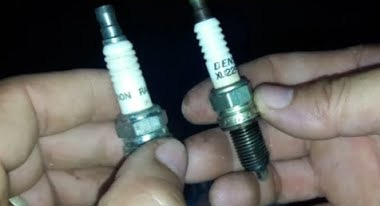
Since resistor-type plugs really “oppose” a portion of the flash energy, non-resistor-type plugs convey an all the more impressive spark. It is thus that most dashing fittings are non-resistor types. In any case, in most auto applications, a resistor plug is needed for appropriate car activity.

Non-resistor spark plugs cause electrical resistance, which may influence vehicle hardware, including the ECU.can Non-register spark plugs result in rough idling, knock sensor code, high-rpm misfire, and abnormal combustion.
The resistor spark plug utilizes an essential resistor to assimilate the radio recurrence energy produced from the spark. Resistor spark plugs typically include an “R” in the part number.
In prior Honda motors, the Resistor was regularly consolidated into the merchant cap or spark plug wires.
With the K-Series motor, the isolated spot for the Resistor is in the spark plug. Practically all-spark plugs are of the resistor type.
What Is The Difference Between A Resistor & Non Resistor Spark Plug?
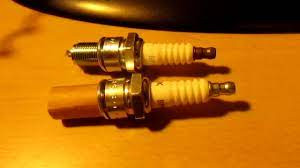
Resistor spark plugs help to resist spark energy and non-resistor spark plugs deliver more powerful spark energy. If you use non-resistor spark plugs in a vehicle that demands a resistor, then it will result in abnormal combustion, idling, and high-RPM misfire.
Here is a table determining the differences between a resistor and a non-resistor spark plug as follows:
| Resistor | Non-resistor |
| The job of a resistor is to filter electromagnetic interference on applications that use engine management computers, depth finder, GPS system, or a two-way radios. | The job of a non-resistor is to deliver powerful spark energy. |
| While selecting or changing a spark plug, you should be aware of finding the correct number. | While changing or switching, finding the right number is not mandatory. |
| You should not choose a spark plug that contains the letter R. | Spark plug with the letter R is the one you should be looking for in a non-resistor spark plug. |
| It is not interchangeable with non-resistor. | If you change it with a resistor, then it can result in idling, misfiring, and combusting. |
| You must ensure the right number in order to get proper performance and avoid side-effects. | You must get the right number and the letter R to get proper performance without any side-effect. |
What is a Resistor Spark Plug?
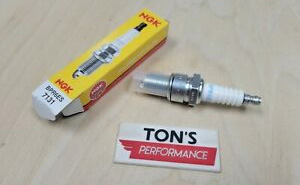
Major nations in the world stipulate radio noise regulations. In order to meet this regulation, manufacturers use resistor spark plugs.
NGK Resistor spark plugs include a five kilo-ohm resistor to suppress or reduce the noise generated during sparking.
Electrical interference that may interrupt automotive radio reception, two-way radio, and cellular phone operation is prevented with these resistor spark plugs. Electrical noise is also kept out of the vehicle’s computer and onboard electronics using this type of spark plugs.
How to Identify Resistor Spark Plug?
There are many ways to check spark plug resistors but here we are mentioning some of the popular ones as follows:
- Using 5000ohm as cut-off points can be a good way to identify resistor spark plugs. Nothing is magical with the number but it seems to work well in this amount of ohm cut-off.
- You can also identify your resistor spark plugs by changing the resistance of the spark plugs. When you will bring a new spark plug, then the resister meter data will change and you will be able to make a comparison and identify the resistor spark plug.
- Resistor stability is another way to identify resistor spark plugs but you need to make sure to check them before installing them to get the right results.
Define Spark Plug Resistor Cap

Consolidated use of the resistor cap and resistor spark plugs is more proficient at stifling start commotion from motors in bikes, snowmobiles, ranch farm haulers, etc.
The plug caps need to protect the association between the high-pressure start leads and the spark plug.
Resistor Spark Plug Cap
Resistor spark plug cap is also known as covers are an important part of the spark plug. If you can use the resistor spark plugs with a resistor cap, then it will be more efficient in suppressing the ignition noise from engines of farm tractors, motorcycles, and automobiles.
The resistor spark plug cap will provide a safer connection between the spark plug and the high-tension leads of ignition.
Why Do We Use Resistor Plug Caps?
Resistor plug caps or covers make the resistor spark plug more efficient. When you use both the resistor spark plug and resistor plug caps at the same time, there will be no ignition noises from your vehicle.
Therefore, if your vehicle is troubling you with ignition noises and you want to suppress it, then use resistor plug caps with resistor spark plugs.
How Do You Check A Resistor On A Spark Plug?
- The main job of a resistor is to provide a clean and precise spark pulse. But if your spark dribbles across the gap, then it will mean the resistor can’t light the fuel or charge properly. It is called the low limits of resistance which is a great way to check a resistor on a spark plug.
- Resistance value should be check properly of a spark plug resistor before buying. You shouldn’t buy a resistor which has a resistance value over 5000ohm or under 500ohm. But the standard resistance value on a spark plug is 4000ohm.
Resistor vs. Non-resistor Spark Plug Caps
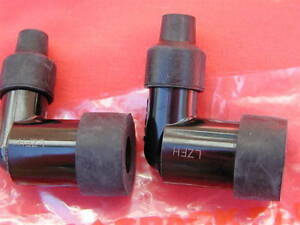
If you are thinking to switch to resistor caps, then try to make sure that the plugs you are using are not resistor types. But when you run 0ohm caps, then you can use resistor plugs.
Though 0ohm caps and non-resistor spark plugs can only be used if the machine is a vintage one and it doesn’t possess modern electronics. The routine job of resistor caps is to maintain the functionality of your electronics properly.
What is the benefit of a resistor spark plug?
The benefit of a resistor spark plug over a non-resistor model is that it helps reduce interference-related issues. It also improves fuel economy and engine performance, as it allows the system to utilize the spark energy in the most efficient manner possible. You can also expect improved combustion and better flame propagation with a resistor spark plug.
What is the benefit of a non-resistor spark plug?
Here are some benefits of installing a non-resistor spark plug in your vehicle.
- Improved Combustion: A non-resistor spark plug helps to provide a complete combustion process due to the increased spark energy and shorter ignition path. This boosts the efficiency and power of your engine.
- More Durable: Because there is a shorter distance for the spark to travel and fire, non-resistor spark plugs are less prone to wear and tear. This means they last longer, reducing the need for regular servicing and repairs.
- Better Fuel Economy: The spark plug’s improved performance helps optimize fuel consumption. Your vehicle will be able to make the most of the fuel it consumes, meaning fewer trips to the gas station.
- Easy to Install: Non-resistor spark plugs are easily replaced with the standard spark plug. This makes the installation job quite simple, saving you time and money.
Can I replace a resistor spark plug with a non-resistor spark plug?
The answer is yes. However, you should be aware that doing so may not be beneficial. When engine loads are moderate or low, the resistors within the spark plugs have no effect.
How to test a non-resistor spark plug
Follow the steps below to learn how to test a non-resistor spark plug:
Step 1: Prepare the Spark Plug
The first step is to get the spark plug ready to be tested. This can be done by carefully separating the rubber boot of the spark plug from the center of the plug.
Step 2: Prepare the Spark Plug Tester
The next step is to prepare the spark plug tester. Firstly, remove the capacitor from the spark plug tester and set it aside. Then, attach the spark plug wire and the spark plug adapter to the spark plug tester.
Step 3: Connect the Spark Plug Tester
Slice the spark plug boot off and then carefully slide the spark plug wire over the end of the spark plug, making sure it is not too tight. Then, insert the spark plug into the adapter and make sure it is securely in place.
Step 4:Plug in the Spark Plug Tester
The final step is to plug in the spark plug tester. Plug it into a power source and then switch it on.
How many ohms should a non-resistor spark plug have?
The answer is between 1,000 and 2,000 ohms. Spark plugs are essential to your vehicle’s engine and serve as an ignition source for combustion. Without them, your engine will not run correctly and will eventually fail without replacement.
What is a non-resistor spark plug?
A non-resistor spark plug is an indispensable component of modern vehicles, used in the internal combustion engine for responding to the voltage generated by a spark plug. Spark plugs are one of the most important components of an engine; they are responsible for igniting the air-fuel mixture inside an engine’s cylinders to produce the power necessary to run an automobile.
What happens if the spark plugs wire resistance is too high?
When spark plug wires have high resistance, it can cause problems in the spark wiring system. This can cause a decrease in performance and increased fuel consumption. High resistance decreases the amount of spark produced, meaning there is less combustion in the engine. This decreased combustion causes a decrease in horsepower and a decrease in fuel economy as well.
How do I know if I need a resistor?
Resistors are an integral part of all electronic circuits. When you’re building a circuit, resistors can be used to control the voltage, current, or frequency of the components in the circuit and to provide a level of safety and protection against too much current.
In some cases, they can even be used as part of the sensor or control system, like in a light dimmer circuit. Generally, if you’re dealing with higher voltages and/or currents, then you’ll need to incorporate a resistor.
NGK Spark Plug Resistance Chart
| Type No. | Resistance |
| LBE | No resistor |
| LBF | No resistor |
| LZEH | No resistor |
| LEH | No resistor |
| LDFH | No resistor |
| LDOF | 1,5,10 |
| LBOFP | 1,5,10 |
What is a non-resistor spark plug boot?
Non-resistor spark plug boot is a strong, powerful, and durable spark producer that can provide you high voltage spark as well. As non-resistor spark plug boot is durable, therefore it doesn’t fail like the resistor ones.
You can use this for a longer period. If you want to get the highest available voltage spark, then non-resistor spark plug boot should be your choice.
A resistor plug and resistor spark plug boot delivery are the somewhat more fragile longer-term spark. Then again, a non-resistor plug and non-resistor plug boot create a higher voltage spark of more limited term.
What will happen when Switching to Non-Resistor Spark Plug?
Usually a resistor plug and a resistor spark plug boot produce a spark which is a little weaker but durable. But when you switch to a non-resistor plug and non-resistor plug boot, then it produce a spark that is powerful as well as durable and consists of higher voltage spark.
Though the differences are minimal, but still this is a factual matter which you need to keep in concentration while switching.
Utilizing a non-resistor spark plug on a framework intended for resistor plugs will debilitate your spark. And in this way, it adversely influences the force yield of the motor.
This is because the opposition of the plug and that of the terminal hole add onto one another.
Resistor vs. non-resistor spark plugs, which is better?
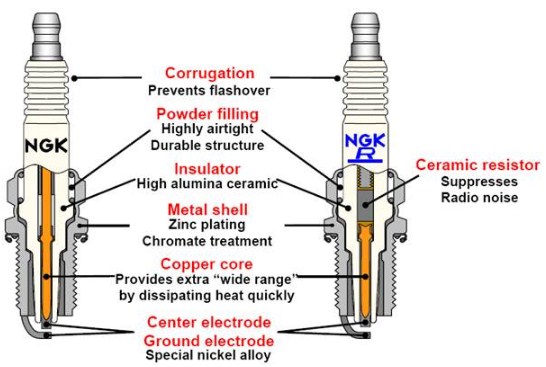
Resistor spark plugs are far better than Non-Resistor spark plugs. Resistor spark plugs can be used in any vehicle because the registered spark plugs reduce the electromagnetic interference with the board-electronics.
Using a non-resistor spark plug, on the other hand, can cause the engine to have unintended side effects such as a faulty idle, incorrect suppression of high-RPM, power drop to a certain RPM level, engine run-on, and abnormal combustion.
Frequently Asked Question
1. Should I use a resistor spark plug?
NGK unequivocally suggests utilizing resistor flash plugs in any vehicle that uses installed computer frameworks to screen or control motor execution. This is because resistor spark plugs diminish electromagnetic impedance with installed electronics.
They are additionally suggested on any vehicle that has other onboard electronic frameworks. For example- motor administration computers and two-way radios. Also GPS frameworks, profundity locators, or at whatever point suggested by the producer.
2. Is a resistor spark plug better than a non-resistor plug on a chainsaw?
Yes. On a current motor, there would be no advantage to a non-resistor spark plug. Cutting edge start curls produce above and beyond voltage and current to make and support a curve across the spark plug hole. Introducing non-resistor fittings will make more undesirable radio obstruction EMI.
3. What is the purpose of a resistor spark plug cap?
Consolidated use of the resistor cap and resistor spark plug is more proficient at smothering start commotion from vehicles. The plug cap protects the association between the high strain start leads and the sparkle plug. Plug caps are made to suit numerous plugs.
Also, many more are of the resistor type, which gives electrical commotion concealment across all frequencies while motor execution isn’t unfavorably influenced.
4. Do resistor spark plugs go bad?
Resistance insecurity is at the core of high resistance spark plug issues. If resistance increments fundamentally after the plug are produced, what was before a proper fitting turns into a bad cork.
Check resistance of all new and cleaned plugs before establishment. Old innovation “stack type” resistor configuration plugs now and then come directly out of the crate with opposition esteems a few times that at which they were produced.
5. What does the R mean in spark plugs?
In the spark plug, R implies Resistor. If R is available, this shows a resistor-type spark plug. Resistor-type spark plugs decrease the measure of radio recurrence resistance (RFI) that can cause start failures to discharge and static on the radio.
Conclusion
Resistors in a spark plug decline the measure of current that is permitted to stream to the cathode. Utilizing a non-resistor plug or eliminating a resistor from the plug yourself will essentially expand the voltage and current across the ground and Electrode to make a much more sultry, more exceptional Spark.
This won’t just boost the effectiveness yet permit an expansion in fuel to stream to the chamber. The main concern is that the more power you can consume, the more force you get. So Resistor vs. non-Resistor spark plugs, which one is best? I hope you understand that.


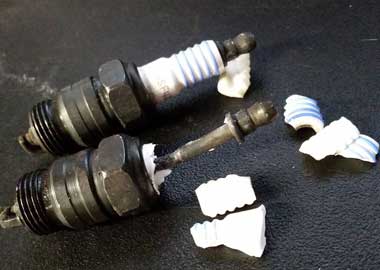

![5 Best Spark Plugs for 5.7 Hemi [Reviews & Guide] in 2023](https://torqueadvisor.com/wp-content/uploads/2021/02/Best-Spark-Plugs-For-5.7-Hemi-1.jpg)
![Top 5 Best Spark Plugs for Mustang V6 [Review Guide] In 2023](https://torqueadvisor.com/wp-content/uploads/2021/06/Best-Spark-Plugs-For-Mustang-V6-1.jpg)